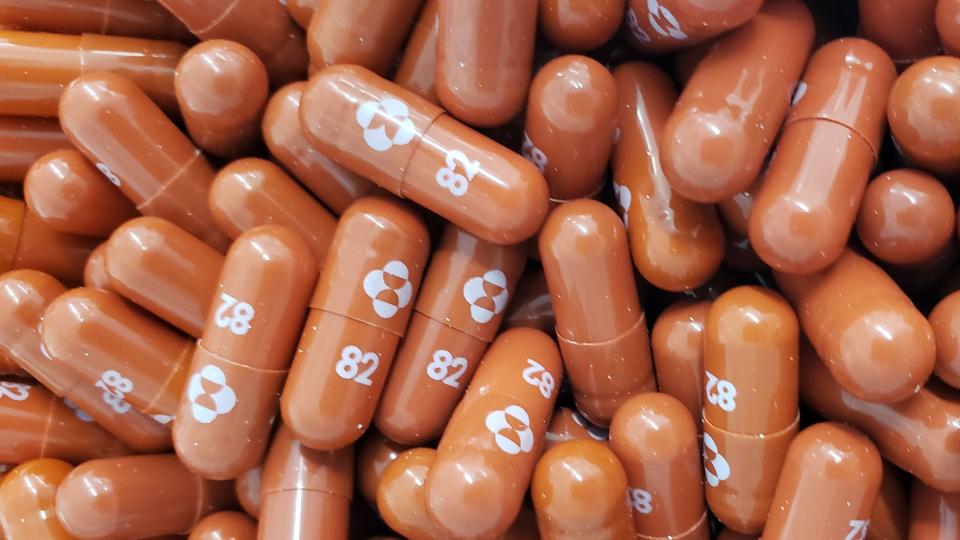Wisconsin's new telehealth program will increase access to free COVID-19 pills
The state health department launched a new telehealth program Wednesday with the idea of providing Wisconsinites free access to prescription COVID-19 antiviral pills.
By prescribing the medications to eligible patients online or over the phone, officials at the state Department of Health Services said, they'll be able to get the antivirals more easily into the hands of people who otherwise may not be able to access them.
Though the pills are widely available and effective in reducing the risk of severe illness, hospitalization and death in high-risk patients, one of the state's biggest hurdles to increasing usage has been timing. The medications must be taken within five days of the start of COVID-19 symptoms, a short window in which eligible patients must test for COVID-19, access a doctor, get a prescription filled and then pick up it up at a pharmacy.
“It is important that people who test positive and are likely to get very sick from COVID-19 consider treatment as soon as possible,” said Dr. Jonathan Meiman, DHS chief medical officer. “Telehealth can help get people started on oral antivirals sooner within the five-day window after symptom onset, which will help save lives.”
The service is free to all Wisconsinites, whether they have insurance or not. The antiviral pills are also free, funded — like COVID-19 vaccines — by the federal government. Telehealth patients can pick up their prescriptions from one of 600 pharmacies that provide the medication or have the pills shipped to their homes overnight.
Patients must be at high risk of developing severe COVID-19, and they must be older than 18 in order to use the telehealth service. A positive test result from an at-home test or one provided by a health care provider is acceptable. Patients should also bring a list of any medications, supplements and vitamins, to rule out any potential drug interactions. People who have kidney disease should also have a copy of their lab results from within the past three months.
According to DHS, risk factors for developing severe COVID-19 include: being 65 or older, being pregnant, having asthma, cancer, diabetes, being overweight, having hypertension, heart disease, sickle cell disease and certain mental health conditions. Having chronic lung, liver and/or kidney disease also increases the risk of severe disease.
"We believe this will be especially important in extending our ability to serve rural, elderly and other underserved populations,” said DHS Secretary-designee Karen Timberlake.
There are two types of anti-viral pills available to treat COVID-19: Paxlovid, created by Pfizer, and molnupiravir (also known as Lagevrio), made by Merck. They are taken twice a day for five days. Paxlovid has been shown to be 90% effective at preventing severe illness from COVID-19. Molnupiravir was shown to be less effective.

The pills are not a substitute for getting vaccinated against COVID-19. COVID-19 vaccines help prepare your body to fight the disease and are available to people regardless of their risk level. Antiviral pills and other treatments help only once you've been infected. Both lower the risk of severe disease.
DHS is also reaching out to pharmacies to see if they're willing to partner with the telehealth program in a way that allows them to become a test-to-treat site, Meiman said. A test-to-treat program allows patients to get tested for COVID-19, get a prescription for an anti-viral and fill it, all in one visit to a pharmacy.
In May, state health officials said they were hoping that the federally supported test-to-treat program would expand, but that has not happened in a significant way. The state has 22 test-to-treat sites today, only six more than it had in May. Most are located in the Milwaukee area.
Meiman said the plan at this point is to keep the telehealth program running for six months.
Telehealth doctors are available from 8 a.m. to 8 p.m., seven days a week. Call 833-273-6330 or visit https://www.dhs.wisconsin.gov/covid-19/telehealth.htm to set up an appointment. Services are available in Amharic, Arabic, English, French, Haitian Creole, Hmong, Korean, Mandarin Chinese (simplified and traditional), Marshallese, Portuguese, Russian, Somali, Spanish, Tagalog and Vietnamese.
The program is offered in partnership with Color Health Inc. Call 844-352-6567 or email treatments@color.com for technical support.
Contact Devi Shastri at 414-224-2193 or DAShastri@jrn.com. Follow her on Twitter at @DeviShastri.
Our subscribers make this reporting possible. Please consider supporting local journalism by subscribing to the Journal Sentinel at jsonline.com/deal.
DOWNLOAD THE APP: Get the latest news, sports and more
This article originally appeared on Milwaukee Journal Sentinel: Wisconsin launches free telehealth program for COVID antiviral pills

